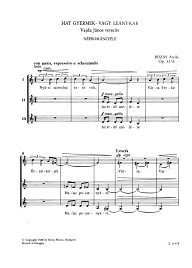The journey of musical works from author to performer
The task of the music publisher is to put manuscripts (be they paper or computerised) into a form that is legible, inspiring, and easy to use for performers; and to ensure the promotion, distribution, and legal use of the works.
With 75 years of experience behind us, we do this honourable work with consideration, commitment, and enthusiasm.
We thank the composers and music teachers who entrust their works to us.
Vajda, János
 His early creative period was characterized by free dodecaphony, then the use of repetitive techniques. This gave place later to a neoromantic, neotonal orientation. He is an important composer for the theatre, to whom a lighter tone and humorous devices are not alien. Through his handling of sound and his formal devices he likes to make frequent allusion to earlier periods in musical tradition. With his art that is rich in character he has evolved a style that is more easily acceptable to a wider audience as well. In addition to theatrical works, ballets and vocal works he also composes orchestral, chamber and solo pieces.
His early creative period was characterized by free dodecaphony, then the use of repetitive techniques. This gave place later to a neoromantic, neotonal orientation. He is an important composer for the theatre, to whom a lighter tone and humorous devices are not alien. Through his handling of sound and his formal devices he likes to make frequent allusion to earlier periods in musical tradition. With his art that is rich in character he has evolved a style that is more easily acceptable to a wider audience as well. In addition to theatrical works, ballets and vocal works he also composes orchestral, chamber and solo pieces.Biography
János Vajda was born in Miskolc on October 8, 1949. Between 1968 and 1973 he studied conducting under István Párkai and between 1970 and 1975 composition under Emil Petrovics at the Liszt Ferenc Academy of Music, Budapest. From 1974 to 1979 he worked as répétiteur with the choir of Hungarian Radio and Television; between 1979 and 1980 he studied composition in Amsterdam on a scholarship. Since 1981 he has been teaching at the Music Academy in Budapest.His prizes and awards
Erkel Prize (1981); Bartók–Pásztory Award (1990); Kossuth Prize (2003); Artisjus Prize (2008) Deutsch
Deutsch English
English Español
Español Français
Français Magyar
Magyar Română
Română Slovenský
Slovenský Slovenščina
Slovenščina 中文
中文


















